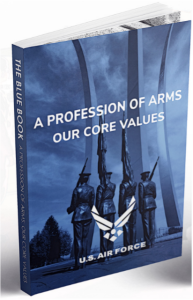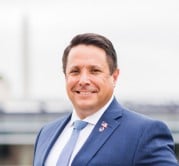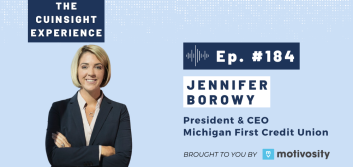Enforcing a standard of ethics in the credit union industry

I am very proud of the credit union industry. In many ways, it reminds me of my military service. True credit union professionals, just like military professionals, adhere to a set of principles that differentiate our industry from “other financial institutions.”
Additionally, as financial cooperatives, our industry also champions the ethical values of honesty, openness, social responsibility, and caring for others. The credit union industry is well-known for its philosophy and reputation of “people helping people.” Because of this, it is important we never lose sight of these underlying values; once we’ve drifted from them, it becomes much more difficult to restore.
For former military professionals who now serve as a credit union board member, an executive, staff member, or as a system partner—I’d like to highlight the Air Force’s Profession of Arms Rule Book, which military members are likely familiar with.

During the time I served as a senior officer in our United States Air Force, I was always impressed with the Air Force Core Values. They routinely served as a guide for conducting myself personally and professionally. These institutional values are published in what is known as the “Blue Book,” which was originally published in 1996. At that time, the Air Force also simplified its core values into three simple phrases that every Airman could easily recite:
“Integrity First.”
“Service Before Self.”
“Excellence in All We Do.”
These easy to remember phrases became institutional values and are expected from every Airman. And, at their core, they are no different from the institutional values of the Army, Navy, Marine Corps, Space Force, and Coast Guard. It is truly a shared tradition of honor and values! Thus, I expect everyone associated with the U.S. Armed Forces, especially retirees, to still carry these values with them in their everyday contributions brought to their new credit union industry roles.
There is an important reason for this expectation and responsibility. Dishonesty and omissions of fact can hurt people and ruin organizations. This includes small, seemingly insignificant occurrences. Lack of integrity can have a corrosive effect over time as one inconsequential lie often leads to more lies. Soon enough, a disturbing cultural trend will likely manifest itself within the organization.
If you have served in the military long enough, you know the consequences will eventually catch up with the organization. And in every case, the past comes roaring back to the first time a lie or omission of fact was allowed to occur inside the organization. Simply put, what might seem like “little white lies” or omissions swept under the rug can later have a greater wave of impact than realized.
I saw this chain of events play out many times during my 25 years in the Air Force. Even if no one was hurt, people responsible for the lie or omission ended up getting fired. Those familiar with the phrase “loss of confidence in the ability to lead” know exactly what I mean. Here is why honor is paramount:
As an officer and three-time commander, our ability to successfully execute the mission depended on having as many of the facts as possible. Sure, there were many times in the military where we were forced to make a decision quickly—despite having incomplete facts for situations beyond our control. However, it is always unacceptable (and, in some ways, criminal) when facts are purposely withheld or misrepresented. Thus, small lies or omissions are a big deal!
Too often people remark that only your “feelings” are hurt when lies and omissions of fact are revealed—especially in competitive business settings. I strongly disagree. If our industry were to ever experience a loss of confidence by the public, in the press, with our regulator, or on Capitol Hill—it will be a monumental loss—and deservedly so.
So how do we enforce a standard of ethics in our industry?
For starters, the obvious; we should never tolerate it in the first place. Senior industry officials should always adhere to and expect others to abide by a code of ethics. Leaders must lead. And in order to set an example as a leader, one must understand the philosophic underpinnings of why they are pledging allegiance to a certain code of ethics; why these values exist in the first place.
For those who want to understand the philosophical and ethics behind the Air Force Core Values, see The Core Values – Framing and Resolving Ethical Issue for the Air Force by Colonel Charles R. Myers (1997). It is an easy read!
Secondly, leaders should be quick to hold others to these same standards. Any person or organization at some point in time is prone to make a mistake. Course corrections are much easier to make sooner rather than later. Yet, in all cases, it is up to industry leaders to exercise courage and accountability in speaking up within the organization and industry. Doing so, privately at first, but publicly, if necessary, can sometimes be a difficult or uncomfortable task. Doing the right thing, especially when there is a tendency to “shoot the messenger,” takes some courage. When an organization or individual persists, then a clear line of distinction needs to be established for the sake of the industry as a whole.
Finally, there are always consequences to be paid in the aftermath of a breach of trust, whether intended or not. In these instances, it is no longer about the individual person or organization. It is about the rest of the industry.
When I was in command, the Air Force had a strict, zero-tolerance policy for driving under the influence. I made my intentions very clear that any infraction would result in a loss of a stripe (demotion in rank) in addition to a fine. For those uninitiated, every commander in the military has judicial powers (G-Series Orders) to enforce military standards via the Uniform Code of Military Justice.
In my years as a commander, I only had to administer six Article 15’s for driving under the influence. The policy was clearly communicated at the outset of each command, and it worked in limiting the number of DUIs which had spiked in the months before my arrival.
One of the last infractions involved a well-liked Airman who was on the cusp of becoming a Senior Non-Commissioned Officer (SNCO). Taking a stripe from this Airman not only meant that there would be a loss in rank, but they would also be “forced out,” or discharged, due to “time-in-grade” restrictions at the lower rank.
Imagine the pressure to look the other way and alter the policy for the sake of this Airman. In the end, I had to consider all the other Airmen under my command as well as those outside my command. I think you know what happened. Consequently, we didn’t have another infraction for nearly a year.
In any instance, it is never truly about the individual person, but always about the overall organization and industry, and maintaining standards and adherence to important values.
So, what are your values and policies for your organization? What is the moral reasoning behind the values you selected for your organization? As an integral part of the credit union movement, how should we police our industry?
I hope this article and the links included get your wheels turning. We, as leaders may not have all the answers, but I do believe this is something we can collectively discuss in making our industry that much better.





